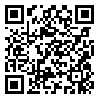Volume 22, Issue 88 (12-2023)
QJCR 2023, 22(88): 60-79 |
Back to browse issues page
Download citation:
BibTeX | RIS | EndNote | Medlars | ProCite | Reference Manager | RefWorks
Send citation to:



BibTeX | RIS | EndNote | Medlars | ProCite | Reference Manager | RefWorks
Send citation to:
Kiani A, Hasanzade A, Jamshidian Y, Jahanbakhshi Z. Prediction of Suicide attempt based on psych aches, interpersonal needs, and peer pressure in students. QJCR 2023; 22 (88) : 3
URL: http://irancounseling.ir/journal/article-1-1731-en.html
URL: http://irancounseling.ir/journal/article-1-1731-en.html
Corresponding Author) Associate Professor, department of Counseling, Shahid Beheshti University, Tehran, Iran. a_kianichelmardi@sbu.ac.ir
Abstract: (3575 Views)
Aim: The aim of this study was to predict suicide attempt based on psychological pains, interpersonal needs, and peer pressure in students. Methods: The research method was descriptive-correlational. The statistical population of the study included all students in city of Rasht (Iran), from which 250 people were selected through random sampling. Research instruments included Schneidmann (1993) Psychache Scale, Joiner et al. (2006) Interpersonal Needs, Dehingra, Budoshk, & O'Connor (2016) Suicide Attempt, and a peer pressure researcher-made questionnaire through which data was collected and analyzed using Pearson correlation and regression. Finding: The results showed that there was a significant relationship between psychological pain (psychache), perceived burdensomeness, and peer pressure with suicide attempts (P <0.01). And the results of regression analysis showed that psych ache and neutral belongingness can predict suicide in students (P <0.05). But the role of psychological pain has a higher power of predictability in suicide attempts among students. Conclusion: It can be concluded that psychological painss and neutral belonging are important factors that can predict suicide in students.
Article number: 3
Type of Study: Research |
Subject:
School counselor
Received: 2023/08/14 | Accepted: 2024/01/21 | Published: 2024/06/2
Received: 2023/08/14 | Accepted: 2024/01/21 | Published: 2024/06/2
Send email to the article author
| Rights and permissions | |
 |
This work is licensed under a Creative Commons Attribution-NonCommercial 4.0 International License. |





